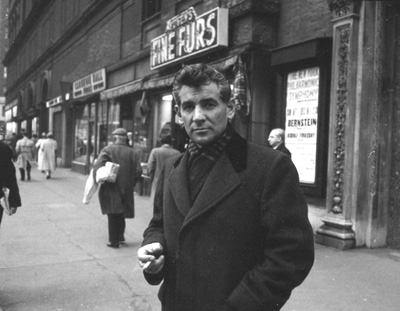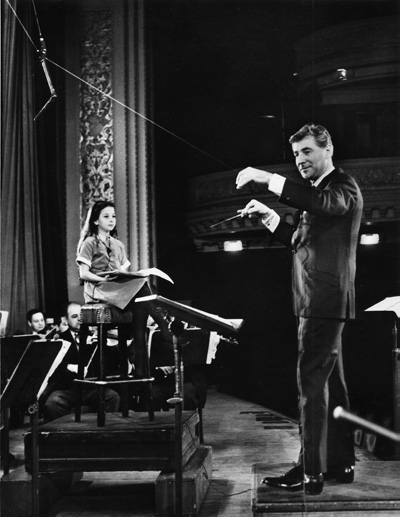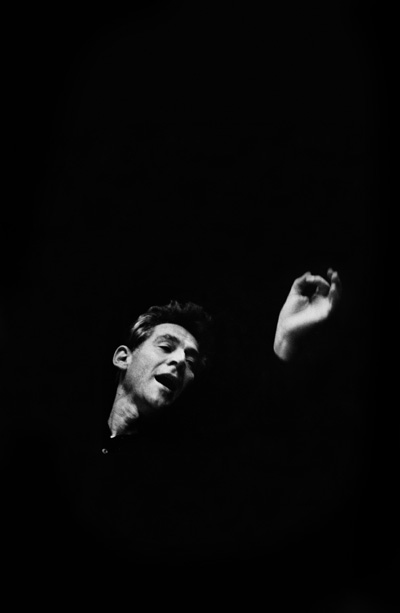
What is the role of the musician in these troubled times? There are fantastic talents in all branches of music and it should be enough just to receive their gifts of composition, shouldn't it?
Well, no. Like any artists, when the world is going to hell in hand basket and justice is trumped every day in favor of cronyism and special access, musicians have, or should have, a unique position in our society. They have captured the hearts and minds of millions of people not only because their notes and words are in our iPods and with us all the time, but also because if they are successful, they have resources.
So they have responsibilities.
Some, but not enough of them, have taken up the challenge.
Bono. Gustavo Dudamel. Simon Rattle. Dixie Chicks, historically Dylan, Baez, Crosby, Stills, Nash et al. Those involved with Rock the Vote.
But the list is deafeningly short.

Leonard Bernstein on Seventh Avenue outside Carnegie Hall, 1946 (Courtesy of New York Philharmonic Archives)
Last night, Carnegie Hall kicked off a three-month festival Bernstein fest events in honor of Leonard Bernstein who, as Michael Tilson Thomas, one of his musical heirs, said at last night's potpourri of Bernstein compositions, "thought of himself as a musician first and a liberal second and wanted to make the world a better place to live."
Bernstein was shameless in his passions for racial justice, an end to the Vietnam war and and an outspoken member of NY society when the worlds of culture and politics were a warm bath for the causes of the left. Lenny's famous party for the Black Panthers in his apartment was immortalized by Tom Wolfe, not necessarily to his advantage. Some of those same people were there last night.

Leonard Bernstein Young Peoples Concert 1960 (Courtesy of Bettman Photos)
I grew up going to the Young People's concerts and listening to them on records; when, through some friends, I eventually found myself at the Bernstein home one Christmas night, sitting next to him at the piano as he lead us in carols, I knew even then that I would remember that as one of the singular moments of my life.
For me, there is nothing above West Side Story. I have seen it, listened to it, danced to it, performed in it, watched ballets confected from it more times that I can count. I know the lyrics to every song, and some of the Robbins moves too. I am not alone in feeling this way. There is something so perfect about this music, these lyrics (Sondheim), that fill your heart up so quickly with emotion that you could smile and weep each time.
This music, too, has its roots in Bernstein's quest to celebrate and mourn the effects of ethnic diversity and worlds colliding in New York. It is every bit as important today as it was when he wrote it, which is why conductors like Gustavo Dudamel still choose it as their signature works. It has a symbolism beyond anything Bernstein could have hoped for.
We buy music, we attend concerts, we make some musicians very, very wealthy. Let us challenge them to continue to make their beautiful music but to get engaged, too, as human beings who can tap into their money and their influence to confront the enormous challenges of our times: to educate young people, to combat racism, to help solve the energy crisis, to empower women. Lenny knew it would come right back at them.
He wrote "Everything we do to fight discrimination -- in any form or field -- will ultimately work toward ameliorating the musical situation".
He died in 1990 after appointing the first woman conductor, making blacks and black music part of his mission, reaching out to Israel and other governments, making a bisexual life a possible one (though not a public one, alas, this is one area he wasn't able to get out in front of), loving New York, continually challenging himself .

Bernstein conducting, by Walter Strate Studio (Courtesy of the New York Philharmonic Archives)
In the 1970s when the NY economy tanked, and Bernstein had received much flak for his Panther party, he began to roam away from the city, to Israel, to Europe, conducting and composing but his later work took on a less immediately connective, or certainly populist bent.
I heard that some conservatives were offended last night that politics were interjected into the proceedings. Here's another way to look at it:
Let's hope in the current economic meltdown, and as the culture wars ramp up again as the bases find themselves increasingly far apart, we find a way to keep our artists and composers close to home. We need them, now, more than ever to help us navigate between us and on our behalf.
